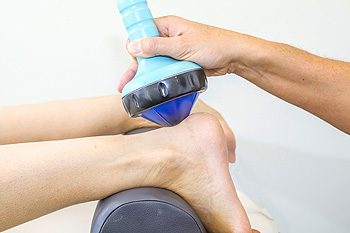 Ingrown toenails are a common foot condition in which the toenails grow into the surrounding skin, rather than over it. This often occurs on the big toes and can result in symptoms such as pain, tenderness, swelling, and redness around the affected toe. While ingrown toenails generally respond well to at home treatments, sometimes they can become infected or frequently recur. They can also be a cause for concern due to underlying health conditions, like diabetes or peripheral artery disease. In these cases, it is suggested that you seek the care of a podiatrist who can offer the right treatments for you. Depending on the severity of the ingrown toenail, the podiatrist may gently lift the nail, prescribe antibiotics to treat infections, or partially or completely remove the nail.
Ingrown toenails are a common foot condition in which the toenails grow into the surrounding skin, rather than over it. This often occurs on the big toes and can result in symptoms such as pain, tenderness, swelling, and redness around the affected toe. While ingrown toenails generally respond well to at home treatments, sometimes they can become infected or frequently recur. They can also be a cause for concern due to underlying health conditions, like diabetes or peripheral artery disease. In these cases, it is suggested that you seek the care of a podiatrist who can offer the right treatments for you. Depending on the severity of the ingrown toenail, the podiatrist may gently lift the nail, prescribe antibiotics to treat infections, or partially or completely remove the nail.
Ingrown toenails can become painful if they are not treated properly. For more information about ingrown toenails, contact one of our podiatrists of Canonsburg Podiatry Associates. Our doctors can provide the care you need to keep you pain-free and on your feet.
Ingrown Toenails
Ingrown toenails occur when a toenail grows sideways into the bed of the nail, causing pain, swelling, and possibly infection.
Causes
- Bacterial infections
- Improper nail cutting such as cutting it too short or not straight across
- Trauma to the toe, such as stubbing, which causes the nail to grow back irregularly
- Ill-fitting shoes that bunch the toes too close together
- Genetic predisposition
Prevention
Because ingrown toenails are not something found outside of shoe-wearing cultures, going barefoot as often as possible will decrease the likeliness of developing ingrown toenails. Wearing proper fitting shoes and using proper cutting techniques will also help decrease your risk of developing ingrown toenails.
Treatment
Ingrown toenails are a very treatable foot condition. In minor cases, soaking the affected area in salt or antibacterial soaps will not only help with the ingrown nail itself, but also help prevent any infections from occurring. In more severe cases, surgery is an option. In either case, speaking to your podiatrist about this condition will help you get a better understanding of specific treatment options that are right for you.
If you have any questions please feel free to contact our office located in Canonsburg and McMurray, PA . We offer the newest diagnostic and treatment technologies for all your foot and ankle needs.





